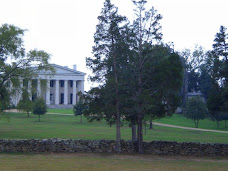DATE: January 9, 2008
FOR MORE INFORMATION:
Jayne Pennington, 434.517.7035
FOR IMMEDIATE RELEASE:
Founders College First Semester - Successes and Lessons Learned
The first semester of Founders College wrapped up December 20, 2007. The small band of first-year students, exhausted from an intensive week of final exams, headed home to far away places like Arizona, Maryland, and Florida. Some students had travel plans to venture to distant lands for their holiday break.
Founders College began its fall semester with 12 adventurous students. As with all colleges, freshmen classes experience some attrition and Founders will begin the Spring semester with 9 students.
Tamara Fuller, Chairman and CEO, said, “Starting a brand new college is a monumental feat, full of challenges at every turn. As with any new enterprise, we have had our share of ‘bumps’ this past 4 months, but I am proud of the current faculty and administration of the College and their unfailing efforts to deliver on our educational promise. I am also pleased with the progress our pioneering students have made. We’re fortunate to have several new faculty joining us in January and are looking forward to an academically invigorating Spring.”
As final grades were recorded, the faculty submitted their first semester assessment reports.
The Dean of Faculty, Bryan Niblett, Ph.D. in his summary stated, “The number of students was small—but their quality was remarkable high. It seems likely that the unique nature of the education, the Founders difference as it is called, attracts particularly venturesome and motivated students.”
The educational model of the College provides for a core curriculum where the various disciplines integrate their content to give students knowledge, perspective, and a depth of understanding about civilization. In support of this model, Dr. Niblett added, “The four core courses offered this semester, Grammar and Writing, Ancient and Medieval History, Philosophy, and Novels I were a sensible combination for the beginning of a 4-year liberal arts degree. The purpose was to produce an inte-grated curriculum in which each subject adds value to the others. This integration has worked well.”
Faculty members constructed their syllabi in concert with each other prior to the start of classes and met frequently to discuss the connections between and among their courses. Faculty also provided individual student assessments. Dr. Robert Garmong, Professor of Philosophy, commented, "In a few short weeks, my students made huge strides in their understanding of complex philosophical issues and their clarity of expression to communicate those ideas. The gains I’ve observed far outstrip anything I’ve ever experienced in my ten years as a college professor.”
Final Exams can be viewed in their entirety at:
http://www.founderscollege.com/News/The College has announced the addition of 2 new and distinguished faculty, Scott Adams, Psy.D., who will be teaching Psychology, and Thomas Rustici, Ph.D. a leading economics lecturer who teaches at George Mason University and Georgetown University in addition to Founders College.
With the departure of Dr. Niblett and Dr. Jena Trammell, whose contracts expired Dec. 22, 2007, the remaining faculty are working with the new faculty to insure the content integration so vital to the educational model.
Founders faculty are also leading the development of the Spring Speaker’s Series to be announced the end of January and administrators are working on expanding community and social interaction for the residential student body.
####










